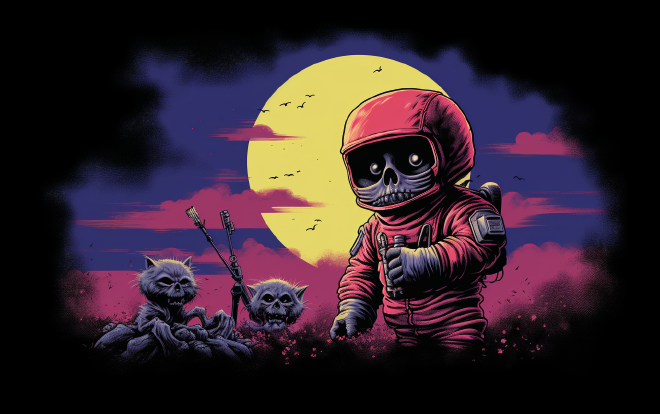Raising an Engineer: Teaching the Wrong Lessons
Table of Contents
Introduction #
Hello, MeatyBytes readers! Nick Miethe here, your favorite OpenShift enthusiast, platform engineer, and the mind behind this ever-evolving stream of data. Aside from my interest in tech, I’m a big fan of challenging the status quo and digging deep into why we do what we do - a product of my incurable curiosity, no doubt. Despite what my teachers told me, it’s this curiosity that has led me to each and every innovation.
In today’s post, we’re going to take a trip down memory lane and revisit some of the lessons we were taught as children. You’ve probably heard them: “Curiosity killed the cat”, “Don’t reinvent the wheel”, “Stick to what you know”. These sayings, while well-intentioned, can often inhibit our natural curiosity and creativity - qualities essential to being successful engineers and innovators.
Synopsis #
But why is this topic important? Because as engineers, especially in the fields of DevOps and Platform Engineering, we are the innovators, the disruptors, the creators of the new and untested. We need to foster and hone our curiosity, not stifle it. Unlearning these childhood lessons and replacing them with a mindset of exploration and continuous learning can play a significant role in our individual and collective growth.
In this post, we’ll dissect some of these common childhood lessons, examine their impact on our mindset, and discuss how we can break free from these ingrained beliefs to encourage innovation and creative problem-solving. So buckle up, as we embark on this journey to unlearn, relearn, and grow.
Let’s challenge these old norms together and foster an environment where we can all be the curious, innovative engineers we’re meant to be!

“Curiosity Killed the Cat” #
From an early age, children are often chastised for being “nosey.” This stems from a societal belief that excessive curiosity could lead to unwelcome intrusions or unnecessary trouble. The proverb “curiosity killed the cat” perfectly encapsulates this sentiment, discouraging probing questions or exploratory behavior.
However, in the realm of engineering, curiosity is a driving force for innovation. Engineers thrive on their ability to question established norms, investigate how things work, and search for better solutions. Without this innate curiosity, advancements in fields like machine learning or quantum computing would be at a standstill, as would much of society. Maybe curiosity did kill the cat, but it created the engineer!
Maybe curiosity did kill the cat, but it created the engineer!
“Look at What Everyone Else Is Doing” #
“Keep your eyes on your own work.” Sound familiar? It’s a common refrain heard in classrooms across the globe, aimed at discouraging academic dishonesty. While cheating should indeed be prevented, the way we teach this lesson can imply that looking to others for insights is wrong.
Contrarily, in engineering and technology, collaboration and shared knowledge are fundamental for rapid progress. The open-source movement exemplifies this concept, fostering a global community where engineers learn from each other’s work, iterate on existing ideas, and build better solutions together. Situational awareness allows us to avoid unnecessarily reinventing the wheel and instead, stand on the shoulders of giants.
“Don’t Reinvent the Wheel” #
Speaking of situational awareness, even as adults we are often told that we shouldn’t “reinvent the wheel”. While this is absolutely true, society frequently extends this to push for net-new always, snubbing their nose at derivative evolutions. Even in childhood education, students are often pushed to create rather than evolve.
Obviously, new innovations are among the greatest goals of humanity. However, no one can consistently crank out entirely new inventions. In fact, some would argue that nearly every new development in modern history is derivative. Regardless of if that is true or not, it remains that there are strong reasons to iterate rather than start new. We didn’t need 100 different wheel types for vehicles, but we also couldn’t use stone wheels on modern vehicles.
So the next time you have a great idea for a DevOps “wheel”, check the CNCF Landscape for a project you could iterate on instead! That said, if your method of transportation doesn’t require wheels, then perhaps you should innovate!
“Stick to What You Know” #
Children are often encouraged to find their niche and stick to it. It is argued that mastery is achieved through specialization, and while there’s some truth to this, it’s not the entire story, especially in engineering.
Engineering is an interdisciplinary field. A systems architect may need to understand networking, hardware, cloud platforms, software development, and more. Additionally, emerging fields like DevOps and Platform Engineering require a breadth of knowledge across various domains. Therefore, embracing the unknown and branching out beyond one’s comfort zone is a key aspect of an engineer’s growth. In fact, there’s an entire discussion to be had around the necessity of an architect to be multi-disciplinary to create modern systems and solutions.
“Don’t Make a Mess” #
Whether it’s toys, craft supplies, or food, children are taught to avoid making a mess. The underlying lesson is to maintain order and avoid disrupting our surroundings.
In engineering, however, “mess” can be synonymous with innovation. Experimenting, prototyping, iterating—these are all “messy” processes, but essential to the design and creation of new technology. A well-organized lab or neat lines of code might look good, but behind every revolutionary product or breakthrough is a process that was, at least at one point, a bit chaotic. Toddlers and Engineers might be more similar than not, but one aspect is certainly shared: the importance of play!
Toddlers, Engineers, and the importance of play
Conclusion #
While the lessons taught in our formative years are invaluable in shaping us into responsible adults, it’s important to recognize when these lessons can stifle the traits that make us successful as engineers. In the ever-evolving field of technology, curiosity, collaboration, broad knowledge, initiative, and a bit of ‘controlled chaos’ can be the drivers that propel us towards our greatest achievements.
So, whether you’re parenting the next great engineering-mind, or still think back to lessons-learned that now hinder your potential, take solace in remembering “not all we know is so”. Until next time!
Further Reading #
- The Innovator’s DNA: Mastering the Five Skills of Disruptive Innovators
- Barking Up the Wrong Tree: The Surprising Science Behind Why Everything You Know About Success Is (Mostly) Wrong by Eric Barker - Highly preferred over the popular book Outliers
If you’re interested in checking out these books, consider trying out Audible from Amazon. With the below link, you can start your Audible Premium Plus trial and get 2 FREE audiobooks, and if you decide to cancel by the end of your 30 day free trial, you still get to keep them!
